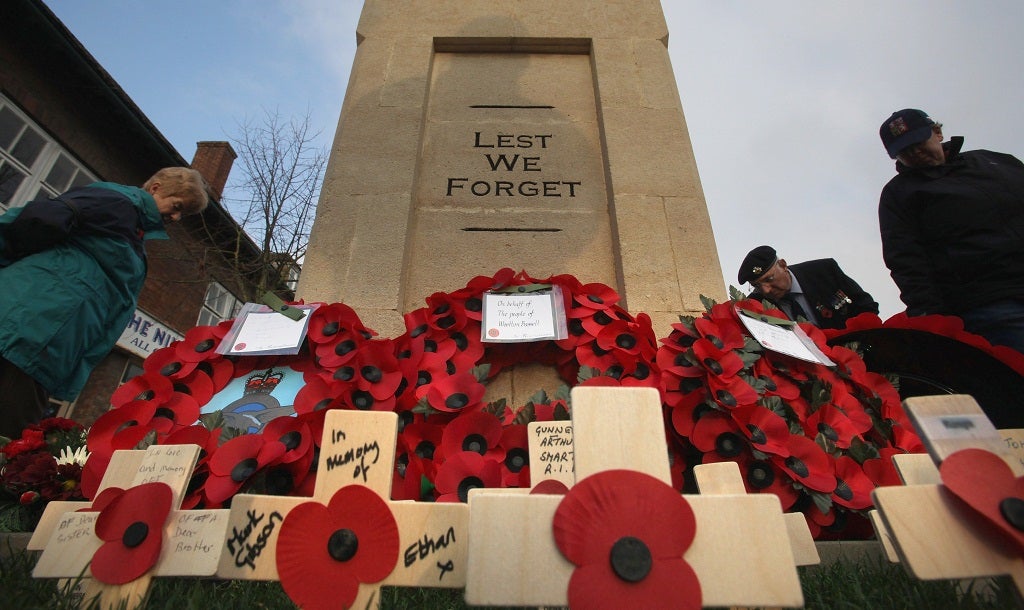The Independent's journalism is supported by our readers. When you purchase through links on our site, we may earn commission.
War is never glorious, so why we do we bully those who protest against poppy culture?
A student refused to lay a poppy wreath last Sunday

The surest way of finding oneself on the wrong side of our moral enforcers is, with words or with actions, to have caused a sacred group or individual of great national esteem “offence”.
From this starting point your fate is very much dependent upon whom it is you have had the misfortune to upset. Celebrities are generally fair game, as are politicians. Sport is a little more complicated, with footballers deemed worthy of a good proverbial kicking but Olympians for some reason beyond reproach. The police and the military, however, well – when it comes to “Bobbies” or “Our Boys” you can collectively bid adieu to every vestige of proportion, reason and restraint.
It is of little surprise, then, to learn that a furore has erupted over a decision by University of London Union (ULU) Vice-President Daniel Cooper to decline an invitation to lay a wreath at Sunday’s Remembrance Service, with fellow students and conservative commentators calling on Cooper to resign.
In his letter to the organisers, Cooper described the service as a commemoration that “doesn’t fit with” the “colossal loss of life, misery and suffering…[that] took place in WW1”.
In response, a former UCL student has described Copper as having “brought shame on himself and the 120,000 students he is supposed to represent”.
“The whole point of Remembrance Day as we know it today is to cast politics aside and pay tribute to the courage, bravery and selflessness of those in uniform both past and present,” Richard Pass writes.
An online petition has also been started to get Cooper removed from his position at the university.
I can’t say that I agree with the decision not a lay a wreath, mainly because I struggle to see how the idea of remembrance can be based selectively on “good” or “bad” wars. In most instances the argument rages over whether or not a war was just long after hostilities have ceased and troops have been brought home; therefore it’s perhaps best simply to put politics to one side and pay your respects.
That said, Sunday’s Remembrance Service, decked out as it was with royalty and establishment figures, was not in any sense apolitical, and Cooper’s refusal to lay a wreath has, if nothing else, punctured the aura of smug credence that for many years has been allowed to re-write the history of Britain at war – and more specifically the loss of life during the First World War.
The racket of war
Before you throw a grenade at your laptop, I’d like first of all to make one thing clear: I’m no pacifist. I believe that non-violence is an immoral position that by its very nature is reliant upon braver and more responsible individuals doing violence on one’s behalf. I believe that pacifism is, as George Orwell put it, “an illusion due to security, too much money and a simple ignorance of the way in which things actually happen”.
I am aware, however, that war is very often a racket. Harry Patch, the soldier who fought in World War One and died three years ago as the last remaining, actually witnessed the slaughter of the “Great War”, and unlike those who wear their combat fatigues vicariously, described the conflict as nothing more than “organised murder”.
The poet Siegred Sasson also wrote penetratingly on the lacerating effect the First World War had on men who in many cases had only recently graduated from short trousers and bed wetting:
Lines of grey muttering faces, masked with fear,
They leave their trenches, going over the top,
While time ticks blank and busy on their wrists,
And hope, with furtive eyes and grappling fists,
Flounders in mud. O Jesus, make it stop!
An elementary truth, often buried underneath all the emotive verbiage about soldiers “defending our freedoms”, is that most of the 16 million killed in the First World War were working people killed in a sordid imperial scramble for resources. That’s it. There was nothing heroic, nor liberating, about perishing face down in a trench full of excrement in Flanders. Britain went to war as part of “a scramble for colonial possessions, markets and resources amongst the major nations”, as Cooper puts it in his letter. Those fortunate enough to survive the ensuing bloodbath were made unquestionably aware of that when they returned home to a Britain beset by misery, squalor and paupery. The pomp and jingoism, the endless processions and evocation of national pride, was little more than the smirk on the corpse, as subsequent attempts at revolution by a war-weary European working class went on to demonstrate.
The establishment likes to inform us that those who perished in the First World War died for our right to live in a free society. We may reflect, then, on whether a fitting legacy to the fallen is for subsequent generations to be bullied into conforming to a very limited notion of remembrance on behalf of those who were themselves bullied into fighting what can be described, accurately for once, as a rich man’s war.
An appropriate remembrance service truly fit for the dead might one day include a disclaimer detailing the lies those young men and women, packed off to war by a British establishment bloating and sating itself at home - and an establishment which was later to make every attempt at crawling up the backside of Hitler - were told. Until then, we should defend the right of people like Daniel Cooper to let their conscience decide the matter.
Join our commenting forum
Join thought-provoking conversations, follow other Independent readers and see their replies
Comments
Bookmark popover
Removed from bookmarks